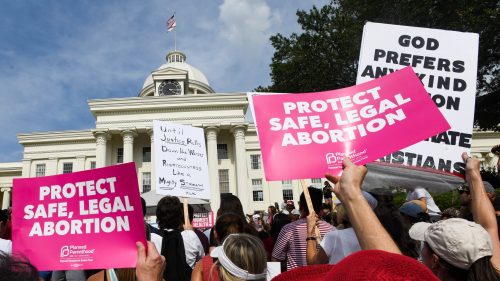

By Ella Rindt
EASTHAMPTON, MASS – In a briefing published Tuesday by Prison Policy Initiative, it was reported the Supreme Court’s 2022 decision in Dobbs v. Jackson Women’s Health Organization has significantly impacted abortion access across the U.S., including for individuals on probation or parole.
According to the report. this decision has allowed state governments to impose stringent restrictions or outright bans on abortion care, leading to a substantial increase in the number of patients crossing state lines for abortion services.
According to The New York Times, since the Dobbs decision, “21 states have implemented abortion rules more restrictive than the standard under Roe v. Wade.”
The report by the Prison Policy Initiative further explains that “14 states now ban abortion altogether, and most other states ban abortion after a certain point in pregnancy.”
Consequently, 41 states have some form of abortion ban in place post-Dobbs, either total bans or gestational limits, according to the Prison Policy Initiative.
The article also explains that for individuals on probation or parole, traveling out-of-state for healthcare, including abortions, is particularly burdensome due to the required permissions for such travel.
The briefing notes that “standard conditions of probation and/or parole require permission to travel out of state, county, or another specified area.”
It highlights these restrictions disproportionately affect women on probation or parole, with an estimated 82 percent of women on probation and 85 percent of women on parole living in states with both abortion restrictions and travel limitations.
The analysis by the Prison Policy Initiative found that over half of the women on probation or parole reside in states with abortion bans more restrictive than those under Roe v. Wade.
Specifically, the briefing states that “over half (53 percent) of women on probation and parole live in the 21 states that the Times identified as banning abortion care at an earlier point than the standard set by Roe v. Wade.”
The Prison Policy Initiative explains that nearly one-third live in states with total abortion bans, and another 17 percent are in states with six-week abortion bans. Consequently, “only 1 in 6 women on probation or parole can access abortion care at any stage of their pregnancy without needing permission to cross state lines,” according to the report.
Further complicating the issue, obtaining travel permits can delay access to abortion care, increasing the risk of complications, noted the Prison Policy Initiative’s report.
For instance, as stated in the report, “a woman on probation in South Carolina who only becomes aware of her pregnancy when she’s eight weeks along will have to travel out-of-state for an abortion. But if it takes two weeks for her to get permission to travel, a non-surgical abortion is likely no longer an option, as the necessary medications are only approved for use until 10 weeks’ gestation.”
The briefing underscores travel restrictions are only one of many barriers faced by people on probation or parole, who often struggle with financial hardships and limited healthcare access.
Prison Policy Initiative notes that people on probation or parole tend to have lower incomes, with “about 60 percent reporting annual incomes below $20,000,” and that “about 25 percent don’t have health insurance to cover the cost of even basic care.”
The briefing advocates for reduced and individualized supervision conditions to improve access to necessary healthcare and minimize the risk of further criminalization for those under community supervision.
It emphasizes that restrictive conditions on movement can have severe health and safety implications, particularly for those seeking abortion care.
The report calls for state legislators, courts and community supervision agencies to “minimize the number and restrictiveness of standard conditions imposed on everyone on probation and parole — and greatly reduce the use of these massive supervision programs in general.”